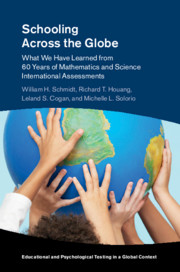 Schooling Across the Globe
Schooling Across the Globe Book contents
- Schooling Across the Globe
- Educational and Psychological Testing In a Global Context
- Schooling Across the Globe
- Copyright page
- Dedication
- Contents
- Figures
- Tables
- Series Editor’s Foreword
- Preface
- Acknowledgments
- Abbreviations
- Part I The Historical Development of Modern International Comparative Assessments
- Part II Conducting International Assessments in Mathematics and Science
- Part III The Lessons Learned from International Assessments of Mathematics and Science
- Chapter 9 Pitfalls and Challenges
- Chapter 10 What Has Been Learned about the Role of Schooling
- Chapter 11 Where Do We Go from Here?
- Book part
- References
- Index
Chapter 10 - What Has Been Learned about the Role of Schooling
The Interplay of SES, OTL, and Performance
from Part III - The Lessons Learned from International Assessments of Mathematics and Science
Published online by Cambridge University Press: 12 November 2018
- Schooling Across the Globe
- Educational and Psychological Testing In a Global Context
- Schooling Across the Globe
- Copyright page
- Dedication
- Contents
- Figures
- Tables
- Series Editor’s Foreword
- Preface
- Acknowledgments
- Abbreviations
- Part I The Historical Development of Modern International Comparative Assessments
- Part II Conducting International Assessments in Mathematics and Science
- Part III The Lessons Learned from International Assessments of Mathematics and Science
- Chapter 9 Pitfalls and Challenges
- Chapter 10 What Has Been Learned about the Role of Schooling
- Chapter 11 Where Do We Go from Here?
- Book part
- References
- Index
Summary
- Type
- Chapter
- Information
- Schooling Across the GlobeWhat We Have Learned from 60 Years of Mathematics and Science International Assessments, pp. 210 - 238Publisher: Cambridge University PressPrint publication year: 2018


